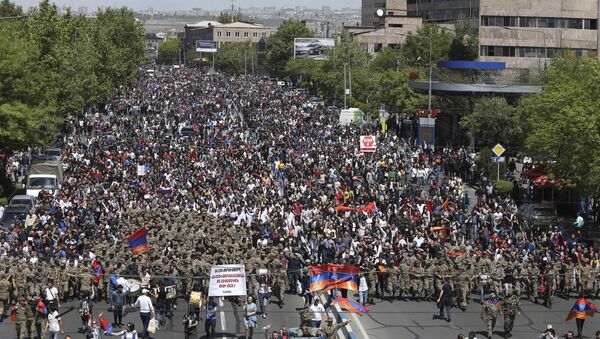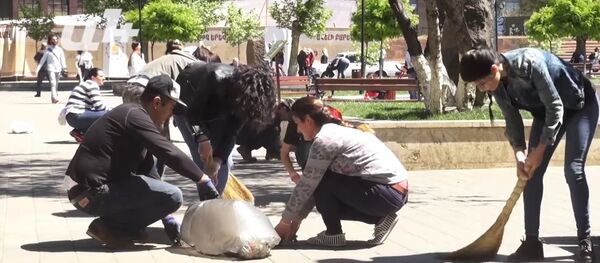On Wednesday, Armenian First Deputy Prime Minister Karen Karapetyan proposed a snap parliamentary election, following ex-Prime Minister Serzh Sargsyan's resignation and failure of negotiations with the opposition on the transition of power. The opposition said it would boycott the snap vote to prevent the ruling Republican Party of Armenia (RPA) from staying in power.
Protests to Remain Trend
On Monday, Sargsyan resigned amid large-scale anti-government protests. Karapetyan became acting prime minister. In his Monday resignation statement, Sargsyan made clear that he had made a mistake in undertaking the office of prime minister.
"[Protest leader] Nikol Pashinyan was right. I have made a mistake. In this situation, there are several solutions, but I will not resort to any of them. It is not for me. I leave the position of the head of our country," Sargsyan said.
Protests resumed on Wednesday in the country’s capital Yerevan, along with Gyumri and several other cities, as the opposition demanded the RPA, which has a majority in parliament, to surrender the government and elect opposition leader Nikol Pashinyan as prime minister pending new elections.
READ MORE: Armenia's Ruling Party to Mull Replacing Leader, Open For Talks With Opposition
The speaker of the parliament, Ara Babloian, announced on Thursday that a special parliamentary session will be held on May 1 where lawmakers will be able to choose the country’s next prime minister.
Emil Sanamyan, an independent analyst on the Caucasus region said that large-scale protests could become a method for the electorate to express its dissatisfaction with leaders of the country who they perceive overstep their office.
"This is very hard to predict, but certainly this large-scale protest sets a precedent. If the current process comes to a peaceful and successful conclusion, it could be repeated in the future in Armenia should other leaders violate basic principles of governance," Sanamyan said.
Dr. Laurence Broers, an associate fellow of the Russia and Eurasia Program at the Chatham House think tank, said that Armenians had previously also resorted to protests to display dissatisfaction with their government.
"But over recent years Armenia has developed an impressive repertoire of civic resistance to authoritarian rule," Broers said.
Broers stated that after protests had been quelled in the country, a new legitimate source of power facilitated by the election was needed.
"There will … be snap parliamentary elections now, which should channel the surge of protest politics into institutions. This is very important: what is needed now is a new legitimation of power, based on free and fair elections," Broers said.
Constitutional Reform Doubtful
On December 6, 2015, 63 percent of Armenians voted in a constitutional referendum, which put the country on course to a parliamentary republic. The amendments that came into force in 2018 extended the executive powers of the prime minister and made the president into a ceremonial figure.
READ MORE: Armenian Revolutionary Federation Party Withdraws From the Ruling Coalition
Sanamyan stated that as the amendments have just taken effect, there is no indication that additional constitutional reform could take place despite Sargsyan leaving.
"This is not being discussed in Armenia at this point. The new constitutional system was only just introduced and has yet to prove itself in practice," Sanamyan said, answering a question on whether the resignation of Sargsyan will lead to constitutional reform.
Broers added that an engaged citizenry was critical to spurring political reform in Armenia rather than constitutional reform, which would be complicated to achieve.
"It still looks as though the enactment of any more constitutional reforms would depend on some complicated and hard-to-achieve coalition politics… The basic point here is that constitutions in Armenia have come and gone. The best curb on unlimited prerogative power is an engaged citizenry, active civil society and a free media," Broers said.
Broers noted that the new parliamentary system was designed to facilitate more institutionalized politics, rather than personality-based politics.
However, Broers stated that it was necessary now for the implementation of the constitutional amendment to the post of prime minister to be implemented in a way that safeguards the office’s power from abuse through state-building.






